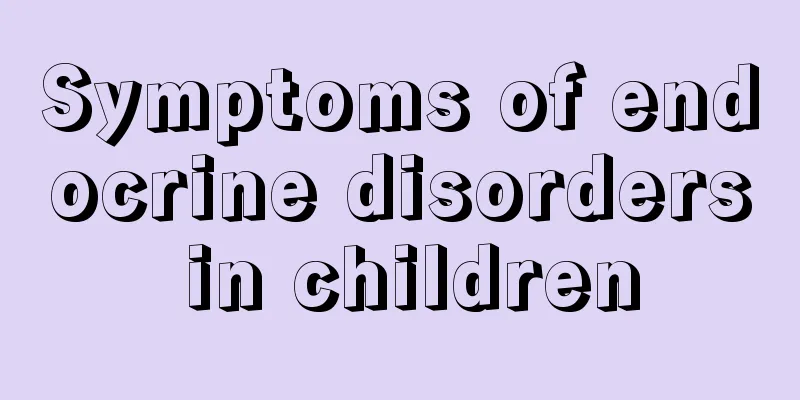The newborn has a lot of small red bumps on his face

|
The skin of a newborn is relatively delicate, and often due to internal or external reasons, some skin manifestations occur, such as the appearance of small red spots. Parents should not panic at this time. There are many reasons for these small red spots. The most common one is eczema. For example, if there is residue in the corners of the baby's mouth after feeding, allergies may occur if it is not wiped in time. In addition, if the child has parasites in the body or endocrine disorders, this manifestation may also occur. The newborn has a lot of small red bumps on his face 1. Family hereditary allergies If a family member has a history of skin allergies such as eczema and atopic dermatitis, it is easy for the condition to be passed on to the baby. 2. Internal diseases Eczema may occur when the baby has parasites in the body, suffers from tonsillitis or endocrine disorders. 3. External reasons If a breastfeeding mother eats some food that can cause allergies in the baby, such as fish and shrimp, it may cause the baby to develop eczema; when the baby has been exposed to some allergens, such as plant pollen, mold, mites, dander from small animals, etc., it may also cause eczema; climate change may also cause eczema in the baby. What to do if there are small red spots on the newborn's face If red spots appear on the child's face and trunk and there is no fever, it means that the child has eczema. When a baby has eczema, parents should take care of the baby from the following aspects. 1. Diet 1. Mothers who mainly breastfeed should avoid spicy food and choose ingredients and fruits that may cause getting angry, such as eating less beef, mutton, longan, lychee, etc. In addition, try not to eat some foods that may cause skin allergies, such as fish, shrimp, crab, etc. 2. If your baby drinks milk powder or milk, you can extend the cooking time of the milk slightly. When feeding eggs to your baby, be careful not to feed the egg whites to babies under six months old because they are not easy to digest. You can only feed the baby the egg yolk, and the baby's food should not be too salty. 3. Let your baby drink more water on a regular basis, and try to give your baby warm water at a regular time and place, but don’t give him too much each time. 2. Washing and Care 1. Do not let your baby do any exercise that causes a lot of sweating, and do not wrap your baby too tightly. Make sure to keep the skin fresh and clean. 2. Parents should pay attention to the fact that when bathing their babies, the bathing products should be neutral and alkaline soaps should not be used. Also, be careful not to use bath products too often. Generally, twice a week is enough. You can just bathe with plain water at other times. 3. Parents can go to the pharmacy to buy honeysuckle or chrysanthemum to boil water, and use a soft towel dipped in the water to bathe the baby. Make sure the water temperature is appropriate and not too high. 4. The baby's skin is very delicate, so be sure to choose soft, light-colored cotton fabrics for the baby. Buy special laundry detergent for baby clothes, and rinse the clothes several times each time you wash them to avoid damage to your baby's skin from residual chemicals. 3. Drug treatment 1. When conducting drug treatment, parents are advised to consult a doctor and conduct drug treatment according to the doctor's instructions. 2. Generally speaking, if red spots appear on the baby's body but do not spread or extend to other parts, iodine tincture can be used for local application. If the baby's body has large patches of red spots, or the symptoms tend to get worse, parents can feed the baby phenergan powder, but it is recommended to consult a doctor before using the medicine. 3. If the baby's eczema is relatively mild, you can use zinc oxide ointment or some creams specifically used to treat children's eczema. In addition, parents can apply dexamethasone ointment, which has anti-inflammatory and antipruritic effects, to the areas with eczema after bathing their baby. Follow the doctor's instructions for dosage. |
<<: Do all newborns breathe very fast?
>>: How to deal with mites bites
Recommend
Baby autumn and winter skin care
The skin of infants and young children also needs...
What's going on with my child's blue eyes?
Female friends who have given birth know that man...
What should I do if my one-year-old child has diarrhea?
When a child is one year old, his digestive syste...
Two month old baby retching frequently
When I was two months old, I relied on milk powde...
What should I do if my child has a sore throat? What are the simplest methods?
When a child has a sore throat, as a parent, of c...
How to adjust mild obesity in children
In any case, the problem of mild obesity in child...
Can babies eat leeks? Eating right is important
For adults, leeks have always been a very good fo...
What should a 5-year-old child eat when he has a cough?
When a 5-year-old child is sick, he or she can cl...
What should I do if my child has a fever in June?
Many children are young and just born, especially...
What are the emergency methods for children with fever at night?
What are the emergency methods for children with ...
What's going on when a child gets red spots on his body that look like prickly heat?
Children's skin is very delicate, so in the s...
What should I do if my child has synovitis and swelling?
Every parent hopes that their children will be he...
What causes congenital cataracts in children? Let you know the real situation
Congenital cataracts are mainly caused by bad hab...
What foods are good for children's hair?
We know that the quality, quantity and health of ...
What are the symptoms of acute gastroenteritis in infants
Infants with acute gastroenteritis need to be tre...









